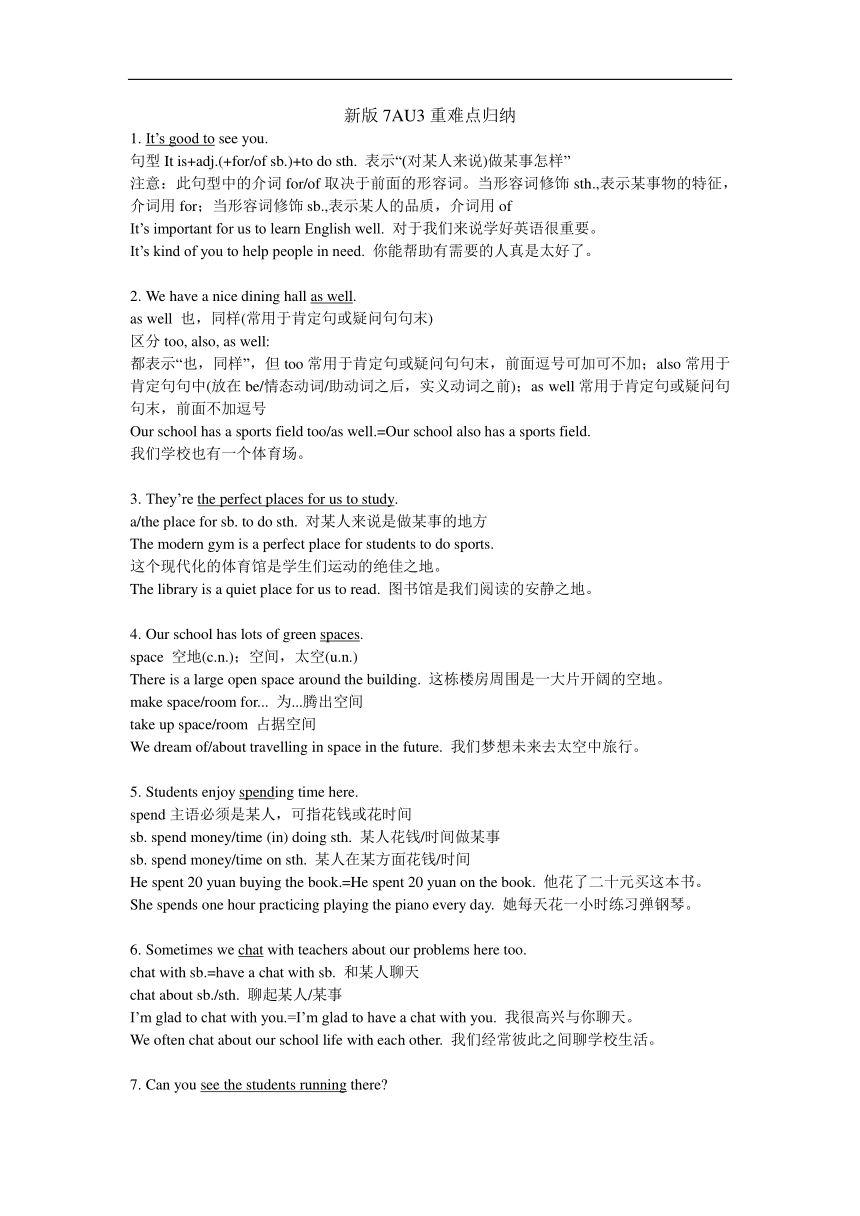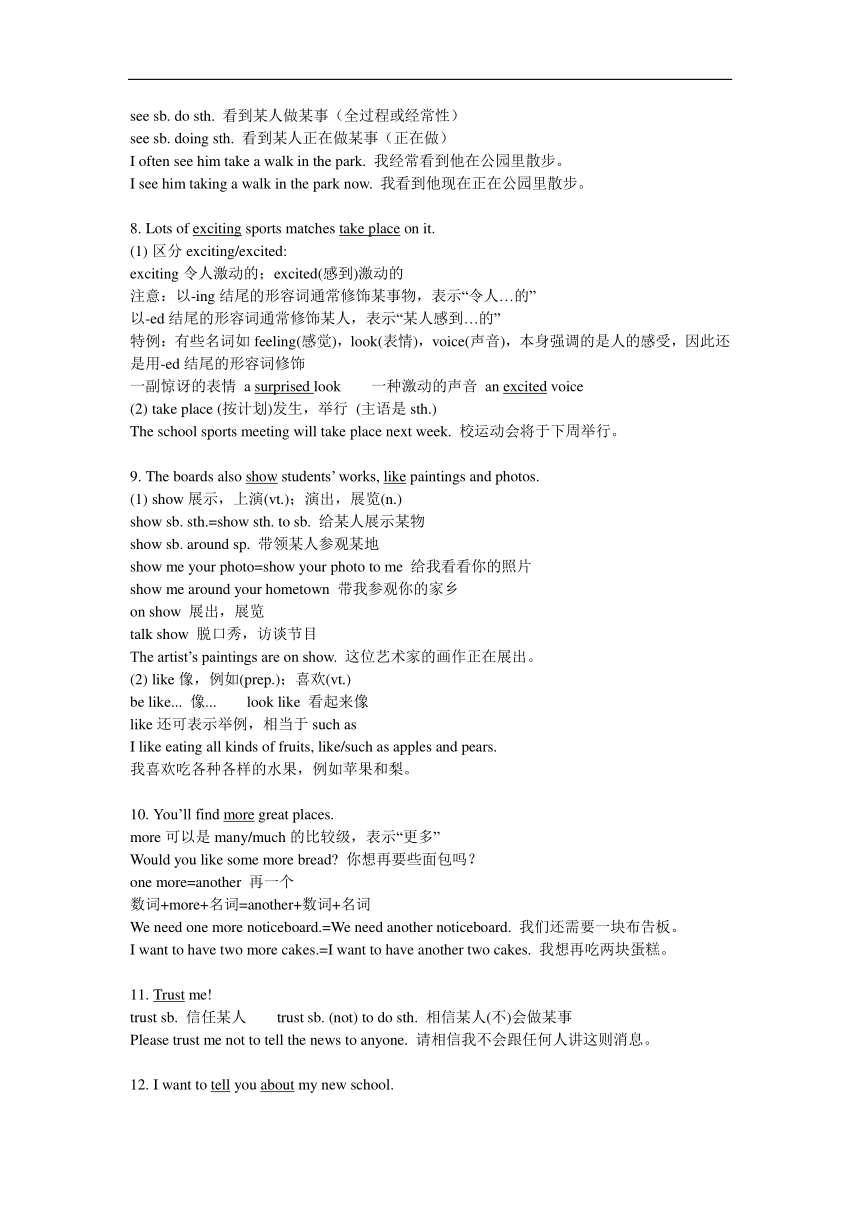Unit 3 Welcome to our school重难点归纳 译林版(2024)七年级上册
文档属性
| 名称 | Unit 3 Welcome to our school重难点归纳 译林版(2024)七年级上册 |  | |
| 格式 | docx | ||
| 文件大小 | 30.5KB | ||
| 资源类型 | 教案 | ||
| 版本资源 | 译林版 | ||
| 科目 | 英语 | ||
| 更新时间 | 2025-07-28 11:53:05 | ||
图片预览


文档简介
新版7AU3重难点归纳
It’s good to see you.
句型It is+adj.(+for/of sb.)+to do sth. 表示“(对某人来说)做某事怎样”
注意:此句型中的介词for/of取决于前面的形容词。当形容词修饰sth.,表示某事物的特征,介词用for;当形容词修饰sb.,表示某人的品质,介词用of
It’s important for us to learn English well. 对于我们来说学好英语很重要。
It’s kind of you to help people in need. 你能帮助有需要的人真是太好了。
We have a nice dining hall as well.
as well 也,同样(常用于肯定句或疑问句句末)
区分too, also, as well:
都表示“也,同样”,但too常用于肯定句或疑问句句末,前面逗号可加可不加;also常用于肯定句句中(放在be/情态动词/助动词之后,实义动词之前);as well常用于肯定句或疑问句句末,前面不加逗号
Our school has a sports field too/as well.=Our school also has a sports field.
我们学校也有一个体育场。
They’re the perfect places for us to study.
a/the place for sb. to do sth. 对某人来说是做某事的地方
The modern gym is a perfect place for students to do sports.
这个现代化的体育馆是学生们运动的绝佳之地。
The library is a quiet place for us to read. 图书馆是我们阅读的安静之地。
Our school has lots of green spaces.
space 空地(c.n.);空间,太空(u.n.)
There is a large open space around the building. 这栋楼房周围是一大片开阔的空地。
make space/room for... 为...腾出空间
take up space/room 占据空间
We dream of/about travelling in space in the future. 我们梦想未来去太空中旅行。
Students enjoy spending time here.
spend主语必须是某人,可指花钱或花时间
sb. spend money/time (in) doing sth. 某人花钱/时间做某事
sb. spend money/time on sth. 某人在某方面花钱/时间
He spent 20 yuan buying the book.=He spent 20 yuan on the book. 他花了二十元买这本书。
She spends one hour practicing playing the piano every day. 她每天花一小时练习弹钢琴。
Sometimes we chat with teachers about our problems here too.
chat with sb.=have a chat with sb. 和某人聊天
chat about sb./sth. 聊起某人/某事
I’m glad to chat with you.=I’m glad to have a chat with you. 我很高兴与你聊天。
We often chat about our school life with each other. 我们经常彼此之间聊学校生活。
Can you see the students running there
see sb. do sth. 看到某人做某事(全过程或经常性)
see sb. doing sth. 看到某人正在做某事(正在做)
I often see him take a walk in the park. 我经常看到他在公园里散步。
I see him taking a walk in the park now. 我看到他现在正在公园里散步。
Lots of exciting sports matches take place on it.
区分exciting/excited:
exciting令人激动的;excited(感到)激动的
注意:以-ing结尾的形容词通常修饰某事物,表示“令人…的”
以-ed结尾的形容词通常修饰某人,表示“某人感到…的”
特例:有些名词如feeling(感觉),look(表情),voice(声音),本身强调的是人的感受,因此还是用-ed结尾的形容词修饰
一副惊讶的表情 a surprised look 一种激动的声音 an excited voice
take place (按计划)发生,举行 (主语是sth.)
The school sports meeting will take place next week. 校运动会将于下周举行。
The boards also show students’ works, like paintings and photos.
show展示,上演(vt.);演出,展览(n.)
show sb. sth.=show sth. to sb. 给某人展示某物
show sb. around sp. 带领某人参观某地
show me your photo=show your photo to me 给我看看你的照片
show me around your hometown 带我参观你的家乡
on show 展出,展览
talk show 脱口秀,访谈节目
The artist’s paintings are on show. 这位艺术家的画作正在展出。
like像,例如(prep.);喜欢(vt.)
be like... 像... look like 看起来像
like还可表示举例,相当于such as
I like eating all kinds of fruits, like/such as apples and pears.
我喜欢吃各种各样的水果,例如苹果和梨。
You’ll find more great places.
more可以是many/much的比较级,表示“更多”
Would you like some more bread 你想再要些面包吗?
one more=another 再一个
数词+more+名词=another+数词+名词
We need one more noticeboard.=We need another noticeboard. 我们还需要一块布告板。
I want to have two more cakes.=I want to have another two cakes. 我想再吃两块蛋糕。
Trust me!
trust sb. 信任某人 trust sb. (not) to do sth. 相信某人(不)会做某事
Please trust me not to tell the news to anyone. 请相信我不会跟任何人讲这则消息。
I want to tell you about my new school.
tell sb. about sth. 告诉某人关于某事(的具体情况)
tell sb. sth.=tell sth. to sb. 告诉某人某事
tell me your name 告诉我你的名字
tell me about your family 跟我讲讲有关你的家庭情况
tell sb. (not) to do sth. 告诉某人(不)做某事
What is your new school like
What is sth. like =How is sth. 某物怎么样?
---What is your classroom like =How is your classroom 你们的教室怎么样?
---It’s bright and clean. 它明亮又干净。
What is sb. like 某人是什么样的?(问长相或性格)
What does sb. look like =How does sb. look 某人看起来是什么样的?(问长相)
---What is your friend like 你朋友是什么样的?
---He is tall and smart. 他又高又聪明。
He teaches English.
teach (sb.) sth. 教(某人)某事
teach sb. to do sth. 教某人做某事
teach sb. how to do sth. 教某人如何做某事
teach oneself=learn...by oneself 自学
Who teaches you Geography 谁教你们地理?(划线部分不能用your)
What do you have for lunch
have...for breakfast/lunch/dinner 早/中/晚餐吃...
---What do you often have for breakfast 你早餐经常吃什么?
---I often have eggs, bread and milk for breakfast. 我早餐经常吃鸡蛋、面包,喝牛奶。
You will find lots of books on different subjects there——thousands of them, in fact!
a book/books on sth. 关于某方面的书(此处on表示“关于”)
(2) be different from... 与...不同
The grey building is different from the blue one. 这栋灰色的楼房不同于蓝色的那栋。
(3) thousands of 几千,成千上万 two thousand 两千
There are thousands of people in the town. 这个镇上有数千人。
The school library has about three thousand books. 这个学校图书馆有大约三千本书。
(4) in fact 实际上,事实上,确切地说
In fact, nobody knows the answer to the question. 事实上,没人知道这个问题的答案。
I'm interested in painting. In fact, I’m good at it. 我对画画感兴趣。确切地说,我擅长画画。
You can borrow three books at a time.
borrow sth. (from sb.) (向某人)借(进)某物
lend sb. sth.=lend sth. to sb. 把某物借(出)给某人
You can borrow books and magazines from the library. 你可以从图书馆借书和杂志。
It's going to rain. I can lend my raincoat to you. 要下雨了。我可以把我的雨衣借给你。
at a time 每次
take two pills at a time 每次吃两粒药
at one time 曾经
There was a dining hall here. 这里曾经有个餐厅。
at times=sometimes=from time to time 有时
There is a reading room with computers on the top floor.
There be句型中,有两个或以上主语时,谓语动词单复数取决于离它最近的主语(就近原则)
There is one gym and three labs in our school.
=There are three labs and one gym in our school. 我们学校有一个体育馆和三个实验室。
on the top floor 在顶楼
注意区别:英式英语中,the ground floor表示“一楼”,the first floor表示“二楼”,the second floor表示“三楼”;美式英语中,the first floor表示“一楼”,the second floor表示“二楼”,the third floor表示“三楼”
a top student 一个尖子生
on/at the top of 在...顶部
on the top of the house 在房顶上 at the top of the page 在页面顶端
What else do you like about our school
区分:else, other
else与不定代词(如something, anything, nothing, somebody, anybody, nobody)或疑问词连用时,else放在后面;other放在名词前面
I have nothing else to say. 我没其他要说的了。
What else can I do for you =What other things can I do for you
我还能为你做些其他什么事情吗?
They really care about us.
care about 关心,在乎 care for照顾;喜欢 take care 保重
Don’t care too much about money. 不要太在意金钱。
Our form teacher always care for/take care of/look after us. 我们的班主任总是照顾我们。
I really don’t care for that kind of food. 我真的不喜欢那种食物。
Take care! See you next time. 保重!下次再见。
Thanks for your email.
Thanks for (doing) sth.=Thank you for (doing) sth. 感谢你(做)某事。
Thanks for lending your magazine to us.=Thank you for lending your magazine to us.
感谢你把杂志借给我们。
Our teachers are quite nice.
quite+a/an+adj.+n.=a/an+very+adj.+n.
quite a special day=a very special day 相当特殊的一天
It’s good to see you.
句型It is+adj.(+for/of sb.)+to do sth. 表示“(对某人来说)做某事怎样”
注意:此句型中的介词for/of取决于前面的形容词。当形容词修饰sth.,表示某事物的特征,介词用for;当形容词修饰sb.,表示某人的品质,介词用of
It’s important for us to learn English well. 对于我们来说学好英语很重要。
It’s kind of you to help people in need. 你能帮助有需要的人真是太好了。
We have a nice dining hall as well.
as well 也,同样(常用于肯定句或疑问句句末)
区分too, also, as well:
都表示“也,同样”,但too常用于肯定句或疑问句句末,前面逗号可加可不加;also常用于肯定句句中(放在be/情态动词/助动词之后,实义动词之前);as well常用于肯定句或疑问句句末,前面不加逗号
Our school has a sports field too/as well.=Our school also has a sports field.
我们学校也有一个体育场。
They’re the perfect places for us to study.
a/the place for sb. to do sth. 对某人来说是做某事的地方
The modern gym is a perfect place for students to do sports.
这个现代化的体育馆是学生们运动的绝佳之地。
The library is a quiet place for us to read. 图书馆是我们阅读的安静之地。
Our school has lots of green spaces.
space 空地(c.n.);空间,太空(u.n.)
There is a large open space around the building. 这栋楼房周围是一大片开阔的空地。
make space/room for... 为...腾出空间
take up space/room 占据空间
We dream of/about travelling in space in the future. 我们梦想未来去太空中旅行。
Students enjoy spending time here.
spend主语必须是某人,可指花钱或花时间
sb. spend money/time (in) doing sth. 某人花钱/时间做某事
sb. spend money/time on sth. 某人在某方面花钱/时间
He spent 20 yuan buying the book.=He spent 20 yuan on the book. 他花了二十元买这本书。
She spends one hour practicing playing the piano every day. 她每天花一小时练习弹钢琴。
Sometimes we chat with teachers about our problems here too.
chat with sb.=have a chat with sb. 和某人聊天
chat about sb./sth. 聊起某人/某事
I’m glad to chat with you.=I’m glad to have a chat with you. 我很高兴与你聊天。
We often chat about our school life with each other. 我们经常彼此之间聊学校生活。
Can you see the students running there
see sb. do sth. 看到某人做某事(全过程或经常性)
see sb. doing sth. 看到某人正在做某事(正在做)
I often see him take a walk in the park. 我经常看到他在公园里散步。
I see him taking a walk in the park now. 我看到他现在正在公园里散步。
Lots of exciting sports matches take place on it.
区分exciting/excited:
exciting令人激动的;excited(感到)激动的
注意:以-ing结尾的形容词通常修饰某事物,表示“令人…的”
以-ed结尾的形容词通常修饰某人,表示“某人感到…的”
特例:有些名词如feeling(感觉),look(表情),voice(声音),本身强调的是人的感受,因此还是用-ed结尾的形容词修饰
一副惊讶的表情 a surprised look 一种激动的声音 an excited voice
take place (按计划)发生,举行 (主语是sth.)
The school sports meeting will take place next week. 校运动会将于下周举行。
The boards also show students’ works, like paintings and photos.
show展示,上演(vt.);演出,展览(n.)
show sb. sth.=show sth. to sb. 给某人展示某物
show sb. around sp. 带领某人参观某地
show me your photo=show your photo to me 给我看看你的照片
show me around your hometown 带我参观你的家乡
on show 展出,展览
talk show 脱口秀,访谈节目
The artist’s paintings are on show. 这位艺术家的画作正在展出。
like像,例如(prep.);喜欢(vt.)
be like... 像... look like 看起来像
like还可表示举例,相当于such as
I like eating all kinds of fruits, like/such as apples and pears.
我喜欢吃各种各样的水果,例如苹果和梨。
You’ll find more great places.
more可以是many/much的比较级,表示“更多”
Would you like some more bread 你想再要些面包吗?
one more=another 再一个
数词+more+名词=another+数词+名词
We need one more noticeboard.=We need another noticeboard. 我们还需要一块布告板。
I want to have two more cakes.=I want to have another two cakes. 我想再吃两块蛋糕。
Trust me!
trust sb. 信任某人 trust sb. (not) to do sth. 相信某人(不)会做某事
Please trust me not to tell the news to anyone. 请相信我不会跟任何人讲这则消息。
I want to tell you about my new school.
tell sb. about sth. 告诉某人关于某事(的具体情况)
tell sb. sth.=tell sth. to sb. 告诉某人某事
tell me your name 告诉我你的名字
tell me about your family 跟我讲讲有关你的家庭情况
tell sb. (not) to do sth. 告诉某人(不)做某事
What is your new school like
What is sth. like =How is sth. 某物怎么样?
---What is your classroom like =How is your classroom 你们的教室怎么样?
---It’s bright and clean. 它明亮又干净。
What is sb. like 某人是什么样的?(问长相或性格)
What does sb. look like =How does sb. look 某人看起来是什么样的?(问长相)
---What is your friend like 你朋友是什么样的?
---He is tall and smart. 他又高又聪明。
He teaches English.
teach (sb.) sth. 教(某人)某事
teach sb. to do sth. 教某人做某事
teach sb. how to do sth. 教某人如何做某事
teach oneself=learn...by oneself 自学
Who teaches you Geography 谁教你们地理?(划线部分不能用your)
What do you have for lunch
have...for breakfast/lunch/dinner 早/中/晚餐吃...
---What do you often have for breakfast 你早餐经常吃什么?
---I often have eggs, bread and milk for breakfast. 我早餐经常吃鸡蛋、面包,喝牛奶。
You will find lots of books on different subjects there——thousands of them, in fact!
a book/books on sth. 关于某方面的书(此处on表示“关于”)
(2) be different from... 与...不同
The grey building is different from the blue one. 这栋灰色的楼房不同于蓝色的那栋。
(3) thousands of 几千,成千上万 two thousand 两千
There are thousands of people in the town. 这个镇上有数千人。
The school library has about three thousand books. 这个学校图书馆有大约三千本书。
(4) in fact 实际上,事实上,确切地说
In fact, nobody knows the answer to the question. 事实上,没人知道这个问题的答案。
I'm interested in painting. In fact, I’m good at it. 我对画画感兴趣。确切地说,我擅长画画。
You can borrow three books at a time.
borrow sth. (from sb.) (向某人)借(进)某物
lend sb. sth.=lend sth. to sb. 把某物借(出)给某人
You can borrow books and magazines from the library. 你可以从图书馆借书和杂志。
It's going to rain. I can lend my raincoat to you. 要下雨了。我可以把我的雨衣借给你。
at a time 每次
take two pills at a time 每次吃两粒药
at one time 曾经
There was a dining hall here. 这里曾经有个餐厅。
at times=sometimes=from time to time 有时
There is a reading room with computers on the top floor.
There be句型中,有两个或以上主语时,谓语动词单复数取决于离它最近的主语(就近原则)
There is one gym and three labs in our school.
=There are three labs and one gym in our school. 我们学校有一个体育馆和三个实验室。
on the top floor 在顶楼
注意区别:英式英语中,the ground floor表示“一楼”,the first floor表示“二楼”,the second floor表示“三楼”;美式英语中,the first floor表示“一楼”,the second floor表示“二楼”,the third floor表示“三楼”
a top student 一个尖子生
on/at the top of 在...顶部
on the top of the house 在房顶上 at the top of the page 在页面顶端
What else do you like about our school
区分:else, other
else与不定代词(如something, anything, nothing, somebody, anybody, nobody)或疑问词连用时,else放在后面;other放在名词前面
I have nothing else to say. 我没其他要说的了。
What else can I do for you =What other things can I do for you
我还能为你做些其他什么事情吗?
They really care about us.
care about 关心,在乎 care for照顾;喜欢 take care 保重
Don’t care too much about money. 不要太在意金钱。
Our form teacher always care for/take care of/look after us. 我们的班主任总是照顾我们。
I really don’t care for that kind of food. 我真的不喜欢那种食物。
Take care! See you next time. 保重!下次再见。
Thanks for your email.
Thanks for (doing) sth.=Thank you for (doing) sth. 感谢你(做)某事。
Thanks for lending your magazine to us.=Thank you for lending your magazine to us.
感谢你把杂志借给我们。
Our teachers are quite nice.
quite+a/an+adj.+n.=a/an+very+adj.+n.
quite a special day=a very special day 相当特殊的一天
同课章节目录
